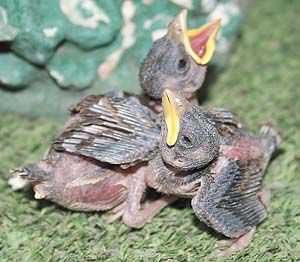| These baby birds had fallen out of their nest in East Carbon. The photographer put them back in the nest. The idea that if humans handle chicks the mother will abandon them is untrue. |
There are a lot of baby birds on the ground right now
And it’s not uncommon to find a baby bird on the ground this time of the year.
It’s also not uncommon to not know exactly how to help the bird.
Knowing about these birds and what to do can be a big help to those animals.
First there are some questions to ask.
•Is the bird an orphan? Fortunately, in most cases, the bird is not an orphan. Most babies are still under the watchful eye of their parents. Unlike human babies, wild babies are not constantly watched by their parents and spend large amounts of time alone. (This is especially true of mammals.)
In most cases, wild animal babies, including birds, should be left alone.
•Fledglings.People will often see baby birds, which are partially feathered, sitting on the ground below a tree. Many automatically assume that the bird fell out of its nest and needs help.
At this stage in a bird’s development, the birds are considered “fledglings.” This is the period in their life when they’re learning to fly. It’s normal for them to jump out or fall out of their nest. The mother bird will continue feeding the bird on the ground until it’s able to fly (this usually takes only a few days).
Unless it’s injured, these birds should be left where they are. Try to keep cats, dogs and curious children away from the bird, so its mother can continue to feed it.
•Cat or dog danger? If a dog or cat is threatening the baby bird, do not instantly bring the baby into a home. Instead, keep the pet restrained during the short time that the baby is on the ground. However, if the pet has already attacked the bird or picked it up-and the bird is injured take the bird to a licensed bird rehabilitator as soon as possible.
•How can I find a licensed rehabilitator? Citizens can learn where licensed rehabilitators are in their area by contacting the nearest Division of Wildlife Resources office. Most rehabilitators will accept these birds without charging a fee.
•Nestlings. Baby birds that don’t have any feathers, or that have feathers that are just starting to come in, are called “nestlings.” These birds stay in their nest, and their parents bring food to the nest to feed them. When a nestling falls out of its nest, people usually find it on the ground, directly below its nest. The baby probably fell out of its nest, was blown out by a wind storm or was “pushed” out by one of its siblings.
•What should be done if a nestling is found on the ground? The best thing to do is to try and place the bird back in its nest. If the person can’t reach the nest, the following works very well.
Make a “makeshift” nest out of a clean Cool-Whip container or a margarine dish. Poke holes in the bottom of it so water can drain. Next, line the bowl with paper towels.Then tack the makeshift nest in the tree as close to the location of the original nest as possible.
Finally, place the baby bird(s) in the nest and leave. The parents will usually come back in a short time and start feeding the babies in your homemade nest.
The only time a baby bird should be brought into a house is if it is known the mother is dead or the baby is injured. Its natural parents will do a much better job of raising it than human can ever do.
A baby bird that is featherless must be fed every 15 to 20 minutes, from about sunrise to 10 p.m. This requires a huge time commitment from a foster parent.
•What if I already touched the birds? The mother won’t come back, will she?
This is not true. Most birds have a very poor sense of smell (vultures are one exception) and will not mind the fact that a person has handled their babies.
If a person does find a baby bird that is an orphan, or is injured, please do the following.
•Get it to a licensed wildlife rehabilitator as soon as possible; the longer the delay, the less chance the bird has of surviving.
•Keep the baby bird warm and in a quiet, dark place until you can bring it to a rehabilitator (a small cardboard box works well).
•Do not give the baby bird any liquids.

